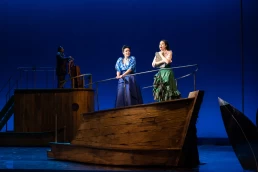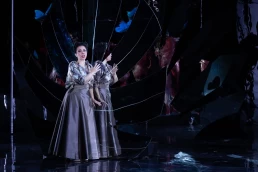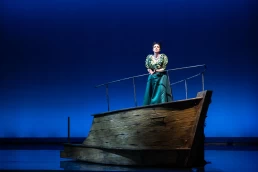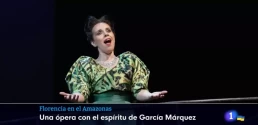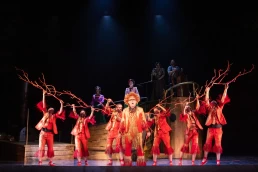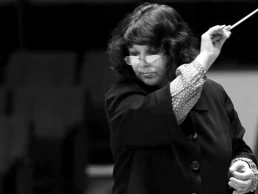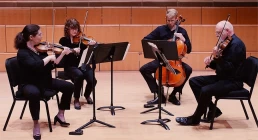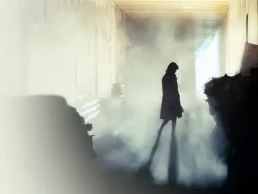La exuberancia de Florencia en el Amazonas contagia el Auditorio de Tenerife
March 28, 2022
La exuberancia de Florencia en el Amazonas contagia el Auditorio de Tenerife
Bachtrack por Francisco Martínez Ramos, 28 marzo 2022
Ópera de Tenerife ha presentado Florencia en el Amazonas, obra del compositor mexicano Daniel Catán, con libreto de Marcela Fuentes-Berain. Estrenada mundialmente en 1996, se trata de una obra tonal y ecléctica, de gran interés y con momentos sobrecogedores. Esta ópera, cuyas funciones en el Auditorio de Tenerife han supuesto su estreno en España, tiene una orquestación brillante y llena de colorido, además de una escritura vocal que permite mucho lucimiento a los cantantes. El libreto, inspirado en el realismo mágico de Gabriel García Márquez, es también rico y variado, centrándose no solo en los aspectos externos y exuberantes sino, sobre todo, en los complejos estados psicológicos de los personajes.
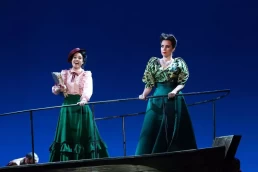
Estreno español de una joya de Daniel Catán
March 28, 2022
Estreno español de una joya de Daniel Catán
Noticia, Ópera Actual – Estrella Ortega
Otra interesante obra que ha presentado Ópera de Tenerife en esta temporada, en este caso, del compositor, escritor y profesor mexicano Daniel Catán (1949-2011), ha sido Florencia en el Amazonas, programada por primera vez en España. La obra, que acumula casi una veintena de montajes desde su estreno en 1996 en Houston, únicamente sumaba dos presentaciones en Europa, concretamente en Alemania y Suiza. Florencia demostró la pasión y originalidad que confería este compositor a sus obras, las cuales luchan por mantenerse en el repertorio. El libreto pertenece a la escritora mexicana Marcela Fuentes Berain y refleja ese movimiento de la literatura iberoamericana conocido como realismo mágico.
Para la directora de escena Chia Patiño la selva y el Amazonas son lugares que despiertan miedo, luces, sombras y una infinidad de sonidos, pero también sueños. Es lo que refleja su puesta en escena en esta nueva producción: frescura, una paleta multicolor, contrastes lumínicos, vegetación y un barco desestructurado que se adapta a las necesidades de la trama.

Se estrena en Tenerife la ópera 'Florencia en el Amazonas'
March 24, 2022
Se estrena en Tenerife la ópera 'Florencia en el Amazonas'
El Auditorio de Tenerife pone en escena estos días la ópera Florencia en el Amazonas, una obra inspirada en el realismo mágico de Gabriel García Márquez. Precisamente fue él quien recomendó a una colaboradora para redactar el libreto.
Con Florencia en el Amazonas, Ópera de Tenerife se introduce en las composiciones latinoamericanas. Esta ópera se programa por primera vez en España, tras un amplio recorrido por las casas de ópera de América y solo dos en Europa, en Alemania y Suiza. La creación del mexicano Daniel Catán, con libreto de Marcela Fuentes-Berain, se estrenó en 1996 y cuenta distintas formas de vivir el amor a través de un viaje en barco por el Amazonas.
Magical Realism Arrives at Tenerife with the Première in Spain of Florencia in the Amazon
March 22, 2022
Magical Realism Arrives at Tenerife with the Première in Spain of Florencia in the Amazon
Magical realism arrives at Tenerife with the première in Spain of “Florencia in the Amazon”. The opera, by the Mexican composer Daniel Catán (1949-2011) is produced by Auditorio de Tenerife with the help of a local and Latinamerican professional team. This title is promoted by Opera de Tenerife. The shows take place on the 22nd, 24th and 26th of March at 7:30 p.m. at the Symphony Hall of the venue.
“Love in the Time of Cholera” and “One Hundred Years of Solitude” are some of the works by Gabriel García Márquez that have inspired this story by Marcela Fuentes-Berain. This musical homage to Gabo and his imaginary arrives at Tenerife with the Ecuadorian director Chía Patiño. She opts for real visual effects and moves away from the usual audio-visual resources, “which have been overused during these two years of pandemic”.
During this boat trip at the beginning of the 20th century to Manaus, Brazil, all want to hear the diva Florencia Grimaldi on her return to her homeland that was constructed in the middle of the jungle. Patiño explains that “we will follow this singer who longs for the past, without being very clear whether she exists or not… Is it a dream? “We have a whole ship coming to see her and I want to create doubt on the viewer as to whether the singer is real or not” explains the director, for whom it is very important to “feel the Amazon jungle, the way it affects people and vice versa”.
Patiño leads this stage show and completes her team with the North American stage designer Izmir Ickbal, the Brazilian costume designer Felype de Lima, the American lighting designer Erin Fleming and the Spanish designer and puppet master Alejandra Prieto.
For the complete article, click the link below.
Un viaje mágico a bordo de ‘El Dorado’
January 22, 2022
Un viaje mágico a bordo de ‘El Dorado’
La ópera ‘Florencia en el Amazonas’ comienza sus ensayos con una escenografía y vestuario únicos
El Día – La Opinión de Tenerife
Falta casi un mes pero en el Auditorio de Tenerife ya se respira la magia de la siguiente cita con el calendario de Ópera de Tenerife: Florencia en el Amazonas, de Daniel Catán. El estreno de esta pieza, una apuesta por la lírica latinoamericana, tendrá lugar el próximo 22 de marzo. Se podrá ver también los días 24 y 26 sobre el escenario de la Sala Sinfónica. Los ensayos, de hecho, ya han comenzado parcialmente. Mañana se incorporarán todos los cantantes.
Artículo completo
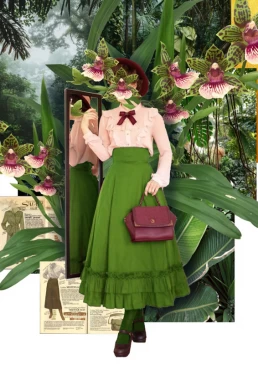
Orpheus & Eurydice image gallery
February 10, 2022
Orpheus & Eurydice
Music by Christoph Willibald Gluck; Libretto by Ranieri de' Calzabigi
A gallery of photos from my latest stage direction for Seattle Opera’s Orpheus & Eurydice that took place at the Tagney Jones Hall Opera Centerin Seattle.
Cast: Christopher Ainslie and Key’Mon W. Murrah as Orpheus, Ariana Wehr and Shelly Traverse as Eurydice, Sharleen Joynt and Deanna Breiwick as Amore.Creative Team: Stephen Stubbs Conductor, Chía Patiño Director, Donald Byrd Chroreogtapher, Carey Wong Scenic Designer, Liesl Alice Gatcheco Costume Designer, Robert Aguilar Lighting Designer, Robertson Witmer Sound Designer, S Katy Tucker Video and Projection Designer, John Keene Chorusmaster and Philip Kelsey Arranger
Carmen Helena Téllez (1955–2021)
December 12, 2021
Carmen Helena Téllez (1955–2021)
Original article at indiana.edu, please click the button below
It is with great sadness that the Latin American Music Center mourns the death of its former director, colleague and friend, the noted Venezuelan-American conductor, composer, and scholar Carmen Helena Téllez. She passed away at her home in South Bend, Indiana, on Friday, December 10, 2021 at 4:45pm.
Born in Caracas in 1955, Carmen studied piano and composition in Venezuela before moving to the United States, where she completed degrees at Indiana University in conducting and piano, including a Doctor of Music with Letter of Distinction in 1989. From 1987–1989 she served as Music Director for the National Chorus of Spain but returned to the US to serve as a Visiting Assistant Professor of Music and Visiting Music Director of the Handel Society at Dartmouth College. In 1992 she joined the faculty of Indiana University as Professor of Music and Director of the LAMC and the Contemporary Vocal Ensemble, serving in these roles for two decades. She also taught as an Adjunct Professor of Latin American and Caribbean Studies and was a Faculty Fellow with the Institute for Digital Arts and Humanities. In 2010 she received the Tracy Sonneborn Distinguished Professor Award for Creativity in Research and Teaching. Under her direction, the LAMC established a recording competition in conjunction with the Office of Education and the Embassy of Spain to champion works by Latin American and Ibero-American composers.
In addition to premiering, recording, and commissioning pieces, Carmen also organized various workshops and conferences, including the LAMC’s 50th-anniversary conference, Cultural Counterpoints: Examining the Musical Interactions between the United States and Latin America, which brought together scholars from around the world in celebration of Latin American music. The center’s Latin American Ensemble and a number of courses currently offered by the center owe their creation to her. Carmen served as research director for nearly twenty doctoral projects during her twenty-year tenure at IU. She received numerous awards and grants to develop her own works and champion other Latin American artists. In 2012, she joined the University of Notre Dame faculty as a Professor of Conducting and Interdisciplinary artist, serving in these roles until her death.
Throughout her life, Carmen dedicated herself to art and music as a scholar, performer, educator, and patron. She commissioned and premiered works by some of the most distinguished choral composers of her time—among them are Juan Orrego-Salas’s La ciudad celeste, Mario Lavista’s Missa ad consolation dominam nostram, Cary Boyce’s Ave Maria, and Ingram Marshall’s Savage Altars. In addition to her work as an advocate for Latin American composers and their works, Carmen worked as a creative producer for a variety of new and modern pieces, seeking to promote living composers and also highlight the co-creative roles of performers and audiences. In addition to work championing other artists, she was a celebrated composer and interdisciplinary artist. She developed an ongoing artistic project known as Kosmologia, which sought to create and produce works that highlighted the relationship between music and scholarship or other arts with a particular focus on the human voice and technology. In 2021, the Princeton Festival premiered her commissioned piece, The Muses Speak, an art-music video. One of her last works, a contribution to a set of symphonic poems inspired by George Seurat, is slated for premiere in January 2022 by the South Bend Symphony Orchestra.
Carmen was an incomparable force whose untimely death leaves an unfillable void in the musical arts community. As we reflect upon her life and numerous accomplishments, we find comfort in the important legacy that she leaves through her works of art, scholarship, and students, and through the many memories and friendships she forged.
(ESP)
Es con gran tristeza que el Latin American Music Center lamenta la muerte de su ex directora, colega y amiga, la destacada directora, compositora y académica venezolana-estadounidense Carmen Helena Téllez. Falleció en su casa en South Bend, Indiana, el viernes 10 de diciembre de 2021 a las 4:45 pm.
Carmen, nacida en Caracas en 1955, estudió piano y composición en Venezuela antes de mudarse a los Estados Unidos, donde obtuvo títulos en la Universidad de Indiana en dirección y piano, incluido un Doctorado en Música con Carta de Distinción en 1989. De 1987 a 1989 se desempeñó como director musical del Coro Nacional de España, pero regresó a los Estados Unidos para desempeñarse como profesor asistente invitado de música y director musical invitado de la Handel Society en Dartmouth College. En 1992 se unió a la facultad de la Universidad de Indiana como Profesora de Música y Directora del LAMC y el Conjunto Vocal Contemporáneo, ocupando estos roles durante dos décadas. También enseñó como profesora adjunta de estudios latinoamericanos y caribeños y fue miembro de la facultad del Instituto de Artes Digitales y Humanidades. En 2010 recibió el premio Tracy Sonneborn Distinguished Professor Award por la creatividad en la investigación y la docencia. Bajo su dirección, el LAMC estableció un concurso de grabación en conjunto con la Oficina de Educación y la Embajada de España para promover obras de compositores latinoamericanos e iberoamericanos.
Además de estrenar, grabar y encargar piezas, Carmen también organizó varios talleres y conferencias, incluida la conferencia del 50 aniversario de LAMC, Cultural Counterpoints: Examinando las interacciones musicales entre Estados Unidos y América Latina, que reunió a académicos de todo el mundo. en celebración de la música latinoamericana. El Conjunto Latinoamericano del centro y una serie de cursos que actualmente ofrece el centro le deben su creación. Carmen se desempeñó como directora de investigación de casi veinte proyectos de doctorado durante sus veinte años en IU. Recibió numerosos premios y becas para desarrollar sus propias obras y defender a otros artistas latinoamericanos. En 2012, se unió a la facultad de la Universidad de Notre Dame como profesora de dirección y artista interdisciplinaria, desempeñando estos roles hasta su muerte.
A lo largo de su vida, Carmen se dedicó al arte y la música como académica, intérprete, educadora y mecenas. Encargó y estrenó obras de algunos de los compositores corales más distinguidos de su tiempo, entre ellos La ciudad celeste de Juan Orrego-Salas, Missa ad consolation dominum nostrum de Mario Lavista, Ave María de Cary Boyce y Savage Altars de Ingram Marshall. Además de su trabajo como defensora de los compositores latinoamericanos y sus obras, Carmen trabajó como productora creativa de una variedad de piezas nuevas y modernas, buscando promover a los compositores vivos y también resaltar los roles co-creativos de los intérpretes y el público. Además de trabajar defendiendo a otros artistas, fue una célebre compositora y artista interdisciplinaria. Desarrolló un proyecto artístico en curso conocido como Kosmologia, que buscaba crear y producir obras que resaltaran la relación entre la música y la erudición u otras artes con un enfoque particular en la voz humana y la tecnología. En 2021, el Festival de Princeton estrenó su pieza encargada, The Muses Speak, un video de arte y música. Una de sus últimas obras, una contribución a un conjunto de poemas sinfónicos inspirados en George Seurat, está programada para su estreno en enero de 2022 por la Orquesta Sinfónica de South Bend.
Carmen fue una fuerza incomparable cuya muerte prematura deja un vacío irrenunciable en la comunidad de las artes musicales. Al reflexionar sobre su vida y sus numerosos logros, encontramos consuelo en el importante legado que deja a través de sus obras de arte, becas y estudiantes, y a través de los muchos recuerdos y amistades que forjó.
Articulo original https://lamc.indiana.edu/
Alexandria Symphony Micro-Grant Winners Announcement
October 28, 2021
Alexandria Symphony Micro-Grant Winners Announcement
I’m exited to share the recording of my composition Wild Swans, one of the winners of the Alexandria Symphony Micro-Grand Program, for more information and details of the announcement please fallow this link
Claudia Chudacoff and Jane Stewart, violins
Eric deWaardt, viola
Schuyler Slack, cello
Alan Wonneberger, recording
In conversation with Chía Patiño, the stage director of Orpheus & Eurydice, Seattle Opera.
September 30, 2021
In conversation with Chía Patiño, the stage director of Orpheus & Eurydice
Seattle Opera.
Taken from www.seattleoperablog.com
Born in Ecuador, Chía Patiño was the Artistic and Executive Director of the National Theatre in Ecuador for 10 years before joining the Butler School of Music at the University of Texas-Austin in 2019 as the Stage Director for the Butler Opera Center. Her path has been eclectic: she began as a pianist, continued as a composer, and began a parallel path as a stage director in 1998. She has staged zarzuela, musical theater, theater, and opera for numerous companies in the United States, Arab Emirates, Egypt, Guatemala, Colombia and Ecuador. Productions she has directed include: Tosca, Traviata, Transformations, Rusalka, Dido and Aeneas, Carmen, Sweeney Todd, Luis Fernanda, West Side Story, Les Miserables, La Flauta Mágica de Los Andes, Faust and Don Giovanni. In 2009, she was the music director of the mariachi opera commissioned and produced by Houston Grand Opera, Cruzar la Cara de la Luna. This is Patiño Seattle Opera debut.
SEATTLE OPERA: Is it true that you and Christina (Scheppelmann) have known each for a long time?
CHÍA PATIÑO: Yes, it is true. We first met at Washington National Opera. I was in the young artist program at the time and Christina was one of the big bosses. We have kept in touch, and over the years, we have tried to see each other. I missed her by a few days when she was working in Barcelona. Years later, we were able to connect in Madrid at a combined Opera America, Opera Latin America, and Opera Europa conference.
SEATTLE OPERA: Do you come from a musical family?
CHÍA PATIÑO: My family is very musical. My parents often fought over who has the best ear for music. My dad thought he did. The word ear in Spanish has two meanings. Either it can mean the body part or it can mean the act of hearing. My father always thought he had the best ear for music, because he had large ears. In actuality, my mother has the best ear for music. My sister is a pianist, living in London. All of my uncles and cousins are amazing amateur musicians. At family gatherings, there is lots of singing and playing the guitar and piano. It turns out that talent does run in the family genes.
SEATTLE OPERA: Can you point to a mentor who inspired you?
CHÍA PATIÑO: Doris Keyes, my piano professor at the University of Louisville, was very influential in my early training. She taught my sister first—the one in London. My sister was completely in love with Doris. My sister compelled me to come to America. At that time, I was not sure I wanted to study music. Doris made me see that I was a musician. Doris was married to a composer, she loved the idea of me becoming a composer. Sadly, her husband died in an accident the summer before I was to start studying with him.
SEATTLE OPERA: Your adaptation of Mozart’s The Magic Flute, La flauta mágica de los Andes, was widely praised. How did it come together?
CHÍA PATIÑO: The reason we began thinking about an adaptation in the first place was that we did not have the orchestra needed to perform it.
SEATTLE OPERA: Really, please explain.
CHÍA PATIÑO: What we did have was a transcription of the music using traditional instruments from the Andes that was written for the Segundo Condor, the theater’s Andean Instrument Orchestra. The plan was still to sing the opera in German. One day, I was in a small village researching native clothing. I was visiting an indigenous dressmaker, telling her the story of The Magic Flute. At first, I didn’t think she would understand the story, but she did. She followed the story completely. We had the sound and I thought we needed the language. I translated the opera into Spanish and that delayed the project. Then I thought, why not add Kichwa (Quechua), the language of the indigenous people.
SEATTLE OPERA: The look was indigenous also?
CHÍA PATIÑO: The look was completely indigenous. We used indigenous artisans to build the costumes, which completely freaked out the designer. The indigenous people do not believe in cutting fabric. They wrap the fabric around themselves until it takes desired shape they want. Then they stop the loom, they don’t cut.
CHÍA PATIÑO: Those decisions were right. The project took almost three years to produce. Everything was time consuming; however, it was worth it! Many native people came to see it. People who did not know anything about opera still came. They only knew there were going to hear native singing and instruments and see native costumes. That was enough to bring them in, and they came!
SEATTLE OPERA: What attracted you to Seattle Opera’s production of Orpheus & Eurydice?
CHÍA PATIÑO: I wanted to explore our relationship with death, especially in this time of COVID. In Latin America, the pandemic has been very bad—everyone knows someone who has died from it. I lost an uncle at the very beginning of the pandemic. Then I lost a good friend. On the night, I learned that my friend had it, I prayed for his life. I had not prayed since I was 15. I started praying because he has three kids and I really wanted him to pull through. I got reports from his brother and from his wife: he was diabetic, he was connected to a ventilator, his kidneys were in bad shape, his liver was damaged, his eyesight affected, and his lungs had collapsed. If he could come back, what type of life would he have? How would his family cope? He would have a tough life. For me, I thought it best that he pass away.
I began to question our obsession with life and living, especially when it isn’t the best thing for the person who is dying. For me to love my friend I had to accept that he had to die. After my friend died, I called Christina (Scheppelmann) and told her that I needed to change the ending. I needed to shift my perspective of Orpheus. If Orpheus really loves Eurydice, he has to accept that she must die. I could not have Orpheus drag Eurydice from paradise. That’s not heroic to me. If anything, I believe, COVID has taught us that we have to make peace with death. It is all right for a person to die, because it is their time. This performance is a meditation about the times that we are living through.
Seattle Opera presents Orpheus & Eurydice Jan. 12-30, 2022 at McCaw Hall. For tickets, casting, and more information, go to seattleopera.org/orpheus.
Dreaming / Undreaming
(ENG)
Originally commissioned and premiered by the Princeton Festival in June 2017 to wonderful reviews as an art-music video, Dreaming/Undreaming will be presented at Ear Taxi in a new mixed media version, with pianist Natasha Stojanovska playing live while the art videos by Camilla Tassi and Ryan Belock are projected in real time, featuring dramaturgy by Chia Patiño and movement by Alexa Capareda.
There will be two versions of this project. In the first concert on Saturday, September 18 at 7:30 pm, Dreaming/Undreaming will deliver the relationship between videos and the music originally designed by the project creators. In the second concert on Sunday, September 19 at 3 pm, the audience will be asked to select the order of the videos to accompany the music. Adventurous audiences are encouraged to attend both versions, to enjoy the diversity and surprises of perception once the video sequence is changed between them. All ticket-holders will be able to enter a website afterwards and watch both the Princeton and the Chicago versions of Dreaming/Undreaming to compare the experiences! Learn more about Kosmologia and Dreaming/Undreaming here!
Dates and Times:
Saturday September 18, 7:30 pm / Sunday, September 19, 3 pm
September 10, 2021
Dreaming/Undreaming
September 18 and 19, 2021 - Ear Taxi Festival in Chicago

(ESP)
Dreaming / Undreaming, originalmente encargado y estrenado por el Festival de Princeton en junio de 2017 con excelentes críticas como un video musical artístico, se presentará en Ear Taxi en una nueva versión de medios mixtos, con la pianista Natasha Stojanovska tocando en vivo mientras los videos artísticos de Camilla Tassi y Ryan Belock se proyectan en tiempo real, con dramaturgia de Chia Patiño y movimiento de Alexa Capareda. Habrá dos versiones de este proyecto. En el primer concierto el sábado 18 de septiembre a las 7:30 pm, Dreaming / Undreaming entregará la relación entre los videos y la música originalmente diseñada por los creadores del proyecto. En el segundo concierto el domingo 19 de septiembre a las 15 horas, se pedirá al público que seleccione el orden de los videos para acompañar la música. Se anima al público aventurero a asistir a ambas versiones, para disfrutar de la diversidad y las sorpresas de la percepción una vez que se cambia la secuencia de video entre ellos. ¡Todos los poseedores de boletos podrán ingresar a un sitio web después y ver las versiones de Princeton y Chicago de Dreaming / Undreaming para comparar las experiencias! ¡Aprenda más sobre Kosmologia y Dreaming / Undreaming aquí!

